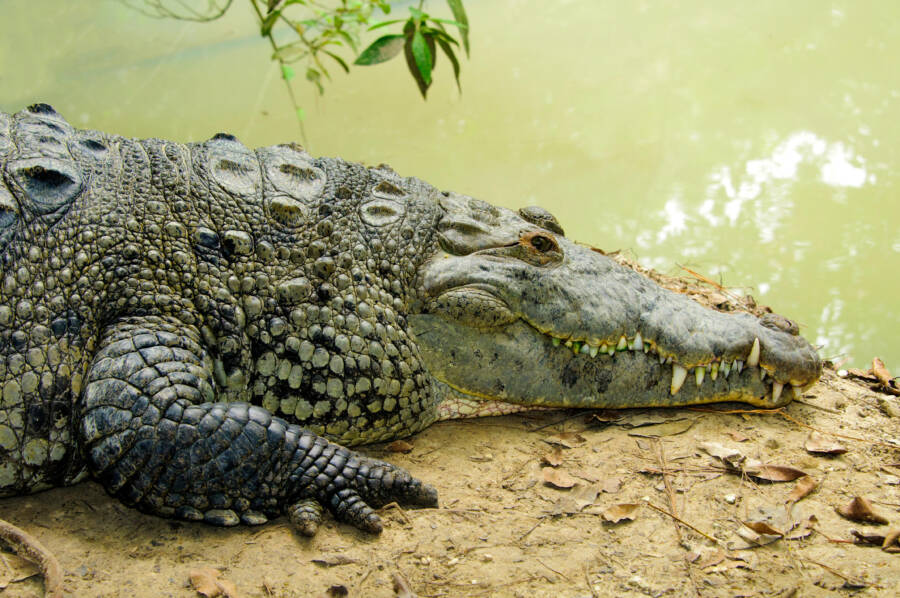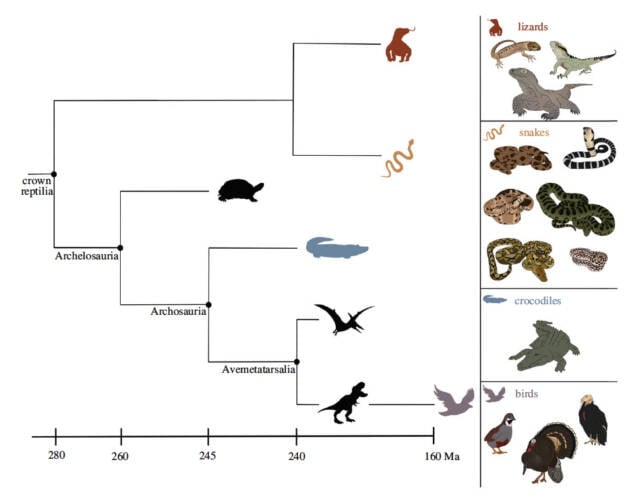The crocodile had lived by herself for 16 years before laying 14 eggs in her enclosure. Zookeepers were shocked to find that some of them were viable.

All Canada Photos/Alamy Stock PhotoAmerican crocodile basking in Belize, Central America.
In 2018, zookeepers at a Costa Rican zoo found 14 eggs in the enclosure of a female American crocodile who had lived alone for the past 16 years.
And while female crocodiles can lay sterile eggs, the zookeepers were shocked to find that at least seven eggs were fertile, ABC News reports. When they put the viable eggs in an incubator, only one continued to develop but eventually stopped. The zookeepers later opened up the egg to find a well-formed, stillborn female crocodile.
With news that a female crocodile laid a viable egg without a mate, researchers began investigating.
Researchers note that parthenogenesis, or the ability of a female animal to asexually reproduce by mixing her own genes rather than requiring a male’s sperm, is present in over 80 vertebrate species, including lizards, snakes, and sharks. But before 2018, researchers had never seen this ability in crocodiles.
In a study published in the journal Biology Letters, researchers found that the stillborn crocodile was a parthenogen. The fetus and its mother shared practically identical genotypes, pointing to a very specific reproductive strategy.
In a virgin birth, a female fuses its eggs with polar bodies — small cells containing chromosomes. Typically, polar bodies are byproducts of eggs dividing during reproduction and simply wither away. But in animals capable of parthenogenesis, the polar bodies fuse with the dividing eggs, making the foundation for a viable fetus.
The research into parthenogenesis in crocodiles also revealed interesting hypotheses about the ability of other, long-extinct animals to asexually reproduce.
“This new evidence offers tantalizing insights into the possible reproductive capabilities of extinct archosaurian relatives of crocodilians, notably the Pterosauria and Dinosauria,” the study detailed.
Given the asexual reproduction ability of birds and crocodiles, it is likely that their common ancestors — dinosaurs and pterosaurs — possessed the ability to reproduce asexually as well.
“What this tells us is it’s very likely that this also happened in pterosaurs and dinosaurs,” Warren Booth, an associate professor of entomology at Virginia Tech who studied the eggs, told the New York Times.
“We’ll never be able to prove they could do it,” Dr. Booth said. “But it suggests they had the ability.”

Booth et al./Biology Letters, 2023A phylogenetic tree of Reptilia. The displayed lineages have records of parthenogenesis.
And although parthenogenesis can create viable fetuses, it lacks the genetic diversity of sexual reproduction and can often lead to less healthy offspring. Despite this, some animals capable of parthenogenesis use this method even when fertile males are plentiful, like the California condor.
Interestingly, some females can lay a clutch of eggs made up of both normal offspring and parthenogens.
Because of this, Dr. Booth suggests that parthenogenesis may have an evolutionary advantage. Their offspring could live just long enough to meet mates and produce more genetically-varied and healthy offspring.
Whatever the reason, Dr. Booth believes that it is an ability that can possibly be switched on and off, and may be controlled by a single gene.
Booth and other study contributors write that parthenogenesis is “likely possessed by a distant common ancestor of [bird, snake, and lizard] lineages.” But of course, researchers must collect more data to “fully test the evolutionary distribution and dynamics of [parthenogenesis] across deeper evolutionary time.”
After learning about the asexual reproduction of a crocodile, discover the “virgin births” of the California condor. Then, dive into the stories of 10 animals that can be both male and female.





